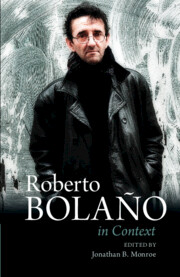Book contents
- Roberto Bolaño in Context
- Roberto Bolaño in Context
- Copyright page
- Contents
- Contributors
- Chronology
- Part I Geographical, Social, and Historical Contexts
- Part II Shaping Events and Literary History
- Part III Genres, Discourses, Media
- Chapter 16 Essays and Short Stories
- Chapter 17 Poetry I: The Ghost That Runs through the Writing
- Chapter 18 Poetry II: Parody and the Question of History
- Chapter 19 The Novel and the Canon
- Chapter 20 Detective Fiction
- Chapter 21 Journalism, Media, Mass Culture
- Chapter 22 Literary Criticism and Literary History
- Part IV Aesthetics, Culture, and Politics
- Further Reading
- Index
Chapter 18 - Poetry II: Parody and the Question of History
from Part III - Genres, Discourses, Media
Published online by Cambridge University Press: 15 December 2022
- Roberto Bolaño in Context
- Roberto Bolaño in Context
- Copyright page
- Contents
- Contributors
- Chronology
- Part I Geographical, Social, and Historical Contexts
- Part II Shaping Events and Literary History
- Part III Genres, Discourses, Media
- Chapter 16 Essays and Short Stories
- Chapter 17 Poetry I: The Ghost That Runs through the Writing
- Chapter 18 Poetry II: Parody and the Question of History
- Chapter 19 The Novel and the Canon
- Chapter 20 Detective Fiction
- Chapter 21 Journalism, Media, Mass Culture
- Chapter 22 Literary Criticism and Literary History
- Part IV Aesthetics, Culture, and Politics
- Further Reading
- Index
Summary
This chapter focuses on Roberto Bolaño poetical imagination; not only his poetry, but the way he uses poetry and the poet, as a literary figure, to stage an ironic and parodic representation of literature in the context of ongoing globalization. My main contention is that the exilic condition of Bolaño’s life and works defines his relationship to Latin American literature at large; thus, far from repeating conventional investments in literature’s potential to express Latin American singularity and to, somehow, supplement the historical process as a process leading to final liberation, what predominates in his works, and particularly in his decisive novel The Savage Detectives, is a skeptical understanding of the final disarticulation between literature and history. His characters, in other words, far from the mythical investment of Latin American romantic and revolutionary-like characters of the past, are defined by a nomadic and uncertain way of living detached from the age of commitment and political programs.
- Type
- Chapter
- Information
- Roberto Bolaño In Context , pp. 201 - 211Publisher: Cambridge University PressPrint publication year: 2023

